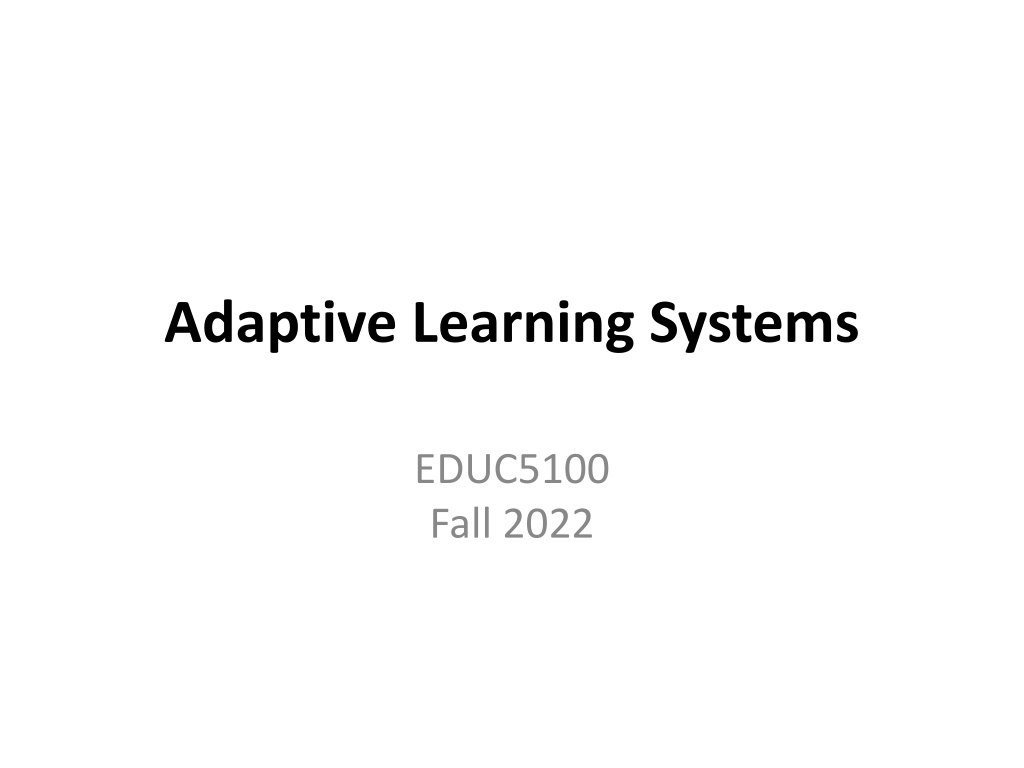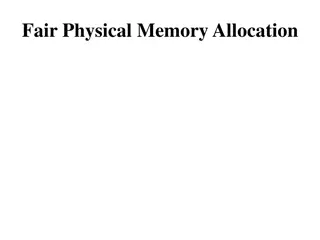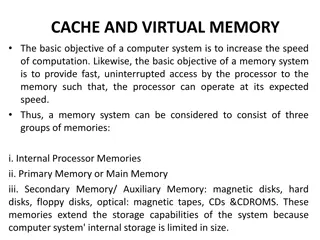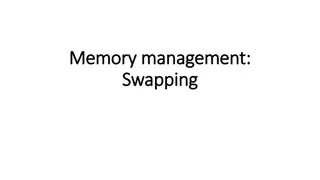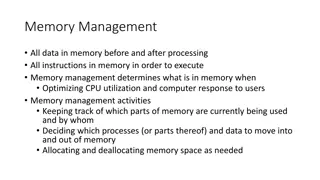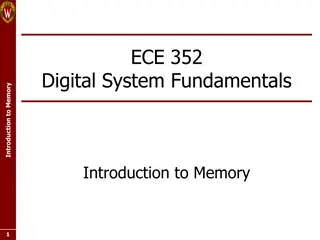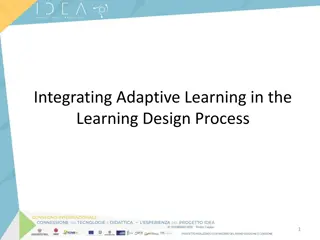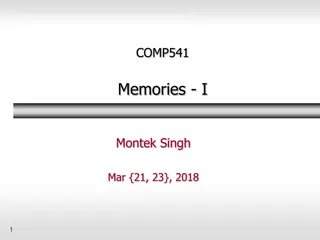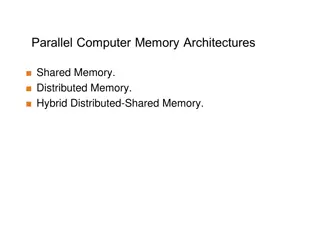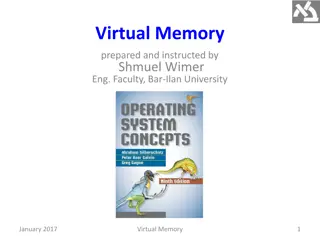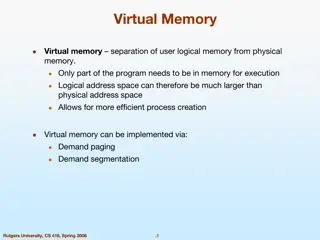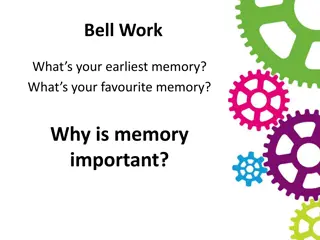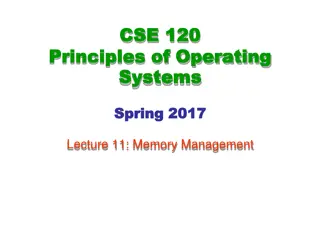Understanding Memory Models in Adaptive Learning Systems
Explore the world of memory optimization and spiraling review in contemporary learning systems with a focus on memory models. Discover how adaptivity supports these aspects and learn about the curious nature of forgetting and remembering, influenced by factors like frequency of encounter and spacing in memory algorithms.
Download Presentation

Please find below an Image/Link to download the presentation.
The content on the website is provided AS IS for your information and personal use only. It may not be sold, licensed, or shared on other websites without obtaining consent from the author. Download presentation by click this link. If you encounter any issues during the download, it is possible that the publisher has removed the file from their server.
E N D
Presentation Transcript
Adaptive Learning Systems EDUC5100 Fall 2022
We continue today With another relatively advanced and relatively technologically mature aspect of contemporary learning systems Technology: memory models Adaptivity it supports: memory optimization and spiraling review
Quick Quiz What is the capitol of Pennsylvania? (Don t type it in the chat window or say it out loud, just think of it)
Quick Quiz What is the capitol of Pennsylvania? Who immediately remembered this? Who remembered this but it took a couple seconds or longer? Who didn t remember this? (No shame in it)
Quick Quiz What was the name of your first grade teacher? (Don t type it in the chat window or say it out loud, just think of it)
Quick Quiz What was the name of your first grade teacher? Who immediately remembered this? Who remembered this but it took a couple seconds or longer? Who didn t remember this? (No shame in it)
Curious thing Forgetting involves both being unable to recall and being slower to recall
Even more curious How likely you are to remember something depends on How many times you have encountered it How long ago you first encountered it The spacing between times you encountered it
Even more curious How likely you are to remember something depends on How many times you have encountered it How long ago you first encountered it The spacing between times you encountered it This is what memory algorithms usually depend on
But this is not a complete account of how memory works A couple of other key phenomena Spreading activation Chunking Phone numbers (back when we used those) Herb Simon story (finally) Not usually used in memory optimization systems
Spaced Repetition Optimal repetition is spaced out Optimal repetition has increasing intervals
There are algorithms for memory calculation used for optimal spacing ACT-R (Pavlik et al., 2008) MCM (Khajah et al., 2014) Settles & Meeder (2016) DASH (Moser & Lindsay, 2016) DAS3H (Choffin et al., 2019)
Variation in complexity From simple formulas based on times content has been successfully/unsuccessfully remembered, time since seen, and item difficulty (Settles & Meeder, 2016)
Variation in complexity To complex functions using exponential or power function decay of memory of each exposure to content until now (the rest from last slide) Exponential or power decay: a heated argument that some cognitive scientists really, really, really care about
Variation in complexity To complex functions using exponential or power function decay of memory of each exposure to content until now (the rest from last slide) Exponential or power decay: a heated argument that some cognitive scientists really, really, really care about Anderson et al. (1997) Artifactual power curves in forgetting Myung, Kim, Pitt (2000) Towards an explanation of the power law artifact Heathcote et al. (2000) The power law repealed Heathcote et al. (2003) Bias in exponential and power fits due to noise: Comment on Myung, Kim, and Pitt. Walsh et al. (2018) Evaluating the theoretic adequacy and applied potential of computational models of the spacing effect
Key intuition Memory activation drops (somehow) over time When memory activation is higher Response time gets faster Accuracy gets better
For some mathematical details see https://learninganalytics.upenn.edu/MOOT/sli des/W004V007.pdf
There are algorithms that do not explicitly calculate memory, used for optimal spacing SuperMEMO (Wozniak, 1982) QuickTables (see Riedesel et al., 2017) Every ad hoc spiraling review algorithm (Wang & Heffernan, 2014)
Example SuperMemo (original): pre-defined schedule for practice; if you make an error, you go back to the beginning SuperMemo2: adjusted schedule for practice based on item difficulty for current student; if you make an error, you go back to the beginning Used in Anki
Example QuickTables: pre-defined schedule for practice Each time you get correct response, you move forward one table (longer interval) If you make an error, you go back one table (shorter interval)
Information Storage ACT-R, MCM, DASH, DAS3H calculation require examining every past encounter with item (or items involving current skill DAS3H) every time you calculate memory SuperMemo 2 just requires storing number of correct responses in a row, item difficulty for student, and when last practice was QuickTables just requires storing item in a table
As you can probably guess Simpler algorithms used more than most complex algorithms
What are the benefits Of simpler algorithms
What are the benefits Of more complex algorithms
Even simple spiraling review works Leads to better retention of knowledge over time
Why isnt it used all the time? Why do people seem to usually dislike it?
Is it enough? Duolingo does seem to fix the fun problem. Is Duolingo enough to develop fluency?
Is it enough? When is fact memorization good enough?
If you want a fun, interesting, and not so humble read https://www.supermemo.com/en/articles/hist ory
Upcoming classes October 6 Hints and Feedback October 10 System Review Due October 13 Model-Tracing and Constraint-Based Modeling October 20 Supporting Affect and Engagement
